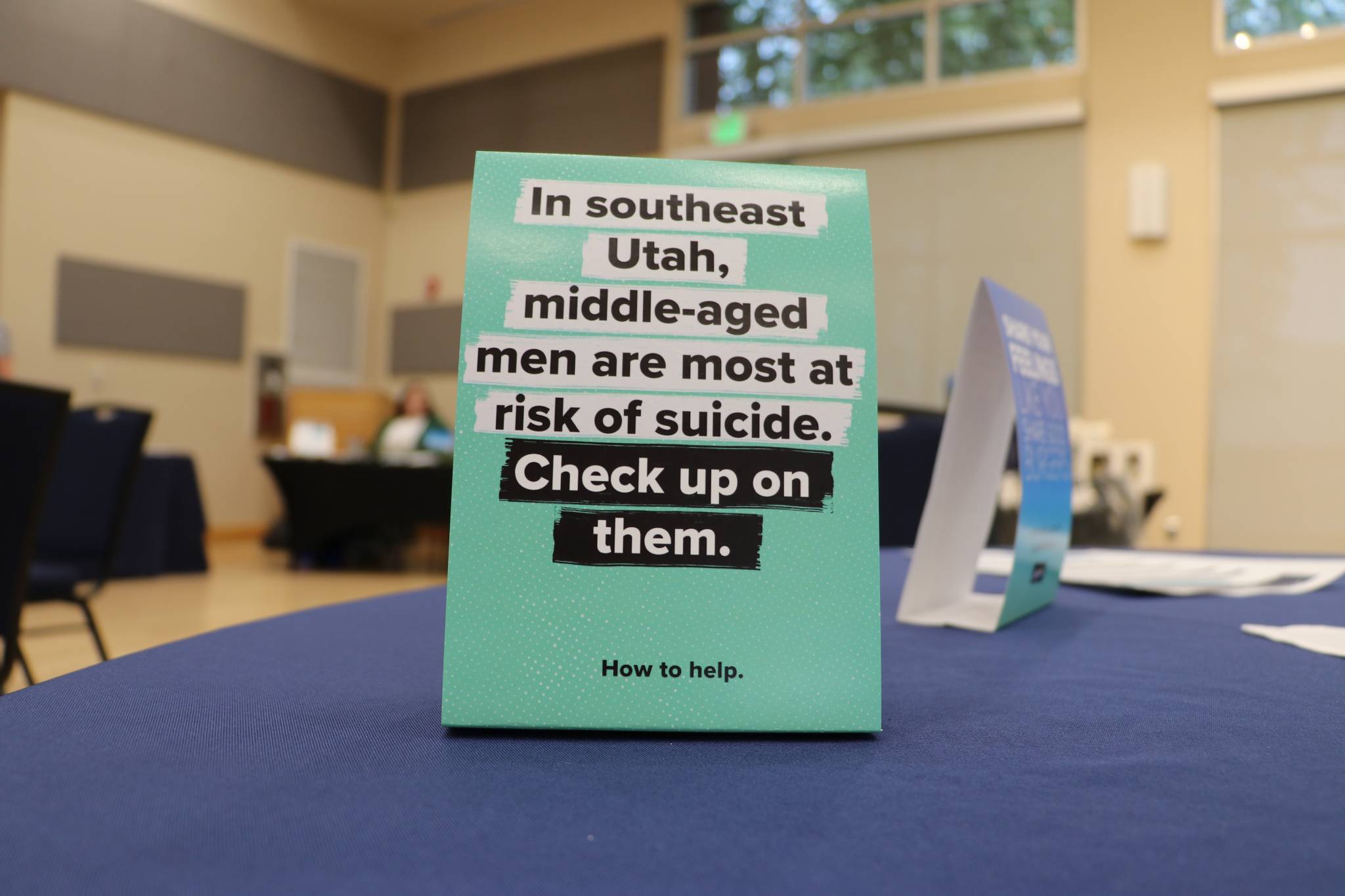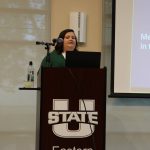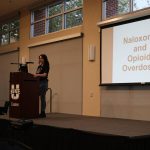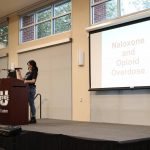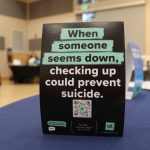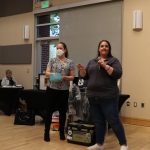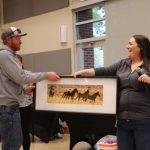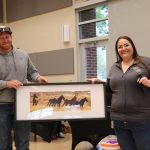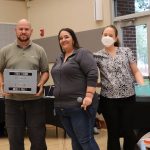On April 30, the Southeast Utah Health Department (SEUHD), USU Extension HEART and the USU Community and Natural Resources Institute (CANRI) came together to host the Carbon and Emery Conversations for Coal Miners and Mental Health, presented by Dr. Kristen Koci.
Dr. Koci discussed the findings and results of the survey conducted by the Utah Wellbeing Project. The Utah Wellbeing Project conducted a state-wide survey used to gauge the wellbeing in each city and town as a way to offer support and identify the issues in each area.
As part of her Doctoral Dissertation, Dr. Koci conducted her own research project for Rural and Natural Resources Development communities in Utah.
The survey for Carbon County was conducted in early 2022, with 438 viable surveys being recorded. Participants had to be residents over the age of 18. There were 131 responses from East Carbon, 46 responses form Helper and 261 responses from Price.
Dr. Koci found that mental health ranked the second most important wellbeing category in Carbon County and ranked the most important wellbeing category in Price. East Carbon, Helper and Price ranked in the top for rural communities for concern for suicide.
It was found that coal mining was one of the top three reasons that mental health issues exist in Carbon County. Dr. Koci conducted 27 interviews, which were approximately an hour long and were in-person or via Zoom. The individuals interviewed consisted of six active or retired coal miners, six directly related to a coal miner, five mental health care providers, four community leaders, with three who work in substance use disorder recovery, and the remaining six who work in different professions throughout the area.
Dr. Koci advised that during her interviews, individuals were asked an array of questions and wanted to share the top three responses for each question asked.
Dr. Koci asked interviewees to explain their relationship between the community and coal mining. One interviewee stated “Coal mining is the core of Carbon and Emery Counties, that’s why we exist.” Another interviewee stated that “Coal and the railroad is what built this area, coal is what brought the immigrants, coal is what brought the jobs here and the diverse culture. Without coal we wouldn’t have Carbon County.”
Interviewees also mentioned that coal mining is what sets Carbon County apart, what makes the area special. One of the interviewees mentioned that it takes a special kind of person to go underground every day, getting dirty and putting their body through that type of work.
She began by asking what sort of mental health issues they believed existed in the community. The top three answers were depression, anxiety and substance use disorder. She said they were then asked “Why do you think mental health issues exist here?” The top three answers were: job insecurity and lack of work in relation to coal mining, rurality and lack of recreational opportunities and an “old school way of thinking”, as interviewees described it.
Dr. Koci found that the reasons the interviewees felt as though coal miners were more at risk for mental health issues were due to higher job stress, longer hours, greater injury risk and being in a job profession where mental health is not discussed.
Dr. Koci discussed that, in terms of job security, many interviewees felt that job insecurity and economic uncertainty in the coal mines played huge roles in the mental health in Carbon County.
Many of the interviewees stated that many of the men in this area work in the coal mines, so when those coal mines shut down or have layoff’s, they start to feel down and depressed. It was also mentioned that due to there not being many other professions that pay what the coal mines pay, that this causes many coal miners to feel stuck in that profession.
One interviewee stated that many coal miners have expensive homes, cars and bills. When the coal mine shuts down it causes an extreme amount of stress for those coal miners, and they are left wondering how they’re going to pay their bills and support their families.
Dr. Koci found that when a coal mine shuts down, there is an increase in substance use disorder because that is how these miners are coping and that, as of right now, there is a huge issue with substance use underground as well.
With risk of injury being another reason that interviewees felt as though coal miners struggle with mental health, one interviewee mentioned that there are so many ways for them to get hurt and they do not know if they’re going to make it out of the mine that day or come out in an ambulance.
One individual stated that they felt as though, many of these young men who go into the mines when they’re young invest so much of their physical health into the job, that when they’re in their 40’s and no longer able to keep up with the same job performance that they once used to be able to, it takes a toll on their mental health.
Another shared that they felt that the constant shift changes from days to nights to graves also played a huge role. The interviewee stated that they have had young coal miners coming in thinking they had suffered a brain injury when in reality they were just sleep deprived.
Lastly, one of the interviewees discussed their father-in-law being a coal miner and the love/hate relationship that he has with it. They discussed how he would talk about it being dark and dangerous and being in a dark and dangerous place is not good for your mental health.
Moving onto lack of recreational opportunities, one of the participants felt as though there simply wasn’t enough to do, causing many people to stay home bored, giving them too much time to think about things. Another interviewee said if you’re not the type of person to go out mountain biking, etc., that is can be depressing sitting at home with nothing to do, with the conclusion being that there isn’t enough to do in Carbon County.
Dr. Koci then discussed what interviewees considered “old school way of thinking”, and what they meant by that. Interviewees stated that many individuals in the Carbon County area are raised to not discuss their problems. They stated that many of the young men from the Carbon County area are taught to just deal with it, not discuss it and that boys don’t cry. The interviewees felt as though, because of this mindset, many men in the Carbon County area were silently struggling, because they believe that it is considered weak to ask for help.
Interviewees asked why they felt as though individuals in the Carbon County area didn’t seek help with their mental health. The top responses were stigma, being unheard, being seen as weak and privacy. Many individuals felt as though, because Carbon County is such a small area, makes seeking professional help a scary concept. Many individuals in this area don’t want others knowing that they’re having issues or needing the help of a professional. Others feel as though there is no privacy in Carbon County. One interviewee mentioned that everyone knows everyone, stating that many individuals could see a truck parked outside of Four Corners and know exactly who it belonged to.
Dr. Koci then asked interviewees what they believed were the top three health resources needed in their community. The top three answers were more mental healthcare providers, a mental health inpatient center and a sober living facility.
Upon conclusion of the interviews, many of the interviewees felt as though we live in a unique community. Many of them felt as though, whenever there is a crisis or a traumatic event, it does not matter how diverse of a community we are, we all come together and are here for each other.
Michelle Ward, Opioid Prevention Specialist with the Southeast Utah Health Department, went over a few of the statistics for opioid use disorder in the nation as well as Carbon and Emery County. Ward then led a training on how to identify when someone is overdosing and how to administer Narcan.
Ward stated that once Narcan has been administered, it is extremely important to get the individual medical attention due to the fact that Narcan only lasts 30 to 90 minutes. Ward stated that because of this, individuals are at risk of overdosing again.
Participants had their names put into a raffle for a chance to win a few different prizes that had been donated by different organizations from Carbon and Emery County.
To review the results of The Utah Wellbeing survey visit: https://www.usu.edu/utah-wellbeing-project/reports/2022/carbon-county-summary-report-2022
To see a comprehensive list of resources for Carbon and Emery County visit: https://extension.usu.edu/heart/resource-books


